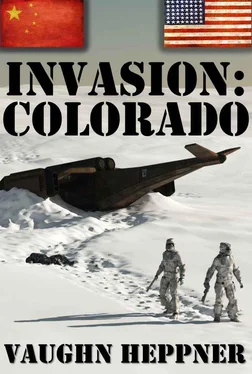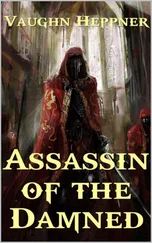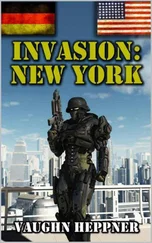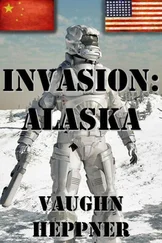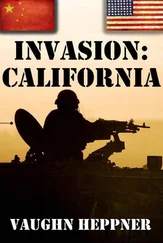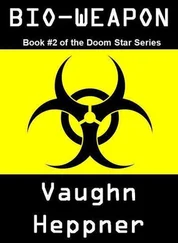With a twist of the throttle and a spring with his legs, Zhu Peng shot into the air. He moved fast, gracefully and under perfect control. This was Zhu’s element. He might not have big muscles, but his flight-control was phenomenal. No one in the company could fly as well as he could.
A sense of well-being flooded through Zhu. He performed tricky maneuvers, going sideways, flipping, abruptly stopping his forward momentum and zooming away backward.
After each twenty-second interval of flight, Zhu automatically checked his fuel-gauge. Eagle Team flyers had died before, crashing to the ground because they ran out of fuel. There was probably nothing in the Chinese Army harder to perfect than flying and fighting during combat in a jetpack.
Now, Zhu focused on the target on the ground. He’d been thinking about this for some time. Usually, during flight, Eagle Team commandos used a grenade launcher carefully fitted to their left shoulder. Grenades were area-effect weapons. A commando was supposed to clear a landing zone for himself. Aiming with an assault rifle in flight took too much concentration. Eagle Team doctrine called for short, hopping flights because a flyer caught by the enemy in the air was soon dead.
Zhu had been thinking about that. He was good with a grenade launcher. But the partisans had learned to distinguish the whoosh of approaching Qui 1000 jets far too well. He wanted to be able to snipe them from the air as they ran away.
Building up speed, flying one hundred meters above the ground, Zhu turned off his jets. He went silent, using stubby glide wings. If the jets didn’t whoosh, the partisans had nothing to hear. Taking his elbows off the armrests, he grabbed his QBZ-95. It was attached to a side-rack. He saw the paper target in the dark and began firing. Unfortunately, he did it too long.
The realization struck him powerfully as he realized he headed down fast. He tried to rack the assault rifle—failed—and let it drop. He didn’t have any more time to stow it. He put his arms on the rests and grabbed the throttle. With a flick of his thumb, he turned the jets back on and gave them fuel.
The jets whooshed and he shot up. As he climbed, Zhu thought about what had just happened.
I almost panicked. How would that have helped me? I must train harder and learn to act calmly in ALL situations. Only then will I be worthy of being called a Bai Hu Tezhongbing.
Zhu turned in flight and began sweeping the area, searching for his gun. He didn’t see Tian watching him from a hidden position behind a large set of bushes. He didn’t see the other man with First Rank Tian Jintao. He didn’t hear the words Tian said, either.
Likely, the words would have surprised Zhu Peng. Even more likely, he would have thought they were joking about him.
Tian said, “There goes China’s most fearless warrior.”
“Why didn’t he join us tonight? The women were very eager to please.”
Tian laughed, although with a sneer. “Join the likes of us? We’re ordinary mortals. Zhu, he is something that comes along only once in a generation. I’ve never seen a flyer like him. Does that satisfy him, though? No. He demands godlike perfection in everything he does. Don’t let that skinny body fool you, or his meek attitude. Zhu Peng is the best White Tiger commando China possesses. Of that, I have no doubt.”
The two continued to watch Zhu fly in the darkness, their eyes shining with envious admiration.
USS MERRIMAC
Captain John Winthrop sat in the submersible’s command chair, with a cushion propped against the small of his back. There was a lump in the cushion. It always pressed against him too hard, constantly making him change position. His back had been hurting for months now and no matter what he did or how he sat, nothing seemed to help for long. The cushion was the latest experiment.
He sat ramrod straight even though that usually made it worse. A sub commander needed to project a certain image, especially during a combat run. He hadn’t slouched several months ago when he and the three-man crew had launched nuclear-tipped missiles at Santa Cruz, California. Those nukes had helped blunt the Chinese amphibious invasion of Monterey Bay. Yes sir, he had sat straight then and he certainly wasn’t going to slouch now.
The Santa Cruz attack had won him and the crew a promotion. It had also gotten them a fast refit of their small carbon fiber submersible. The upgrade had occurred in Seattle. It was an experimental addition and a new way for submarines to go about their business of ship destruction.
For the past two weeks, they had crawled along the bottom of the continental shelf toward Mexico, toward the Baja Peninsula and Mazatlan. The port was outside the Gulf of California and opposite the inner side of the Baja Peninsula in Mexico proper. Mazatlan was a major port for Chinese supplies used in the Midwestern invasion.
Tonight, they would test the experimental adaptations and see if and how they worked.
Captain Winthrop forced a smile onto his narrow face. Because of his back, the smile was painful but heartfelt. Truthfully, he’d like to launch another trio of nukes aimed smack-dab at the port. He wasn’t sure why High Command didn’t give the orders—not that their little submersible had nuclear-tipped Tomahawks anymore. No, such a privilege would have to go to someone else now.
Winthrop’s reasoning was straightforward. The Chinese used nukes. The U.S. should do the same thing, but with more of them. Well, the Chinese had used nuclear weapons. He hadn’t heard of them using anymore since the end of the Californian invasion. Maybe the Chinese and their South American allies figured they didn’t need to use them anymore to win.
“We’re in position, sir,” Warrant Officer Stevens said.
“Good,” Winthrop managed to say without any back-pain entering his words.
Stevens swiveled around. “Do you want me to launch the scout, sir?”
“No. I’ll do that.” With both hands on the armrests, Winthrop pushed himself to a standing position.
Merrimac was tiny as submarines went. It carried more fuel because the former Tomahawk launch tubes had been refitted into diesel tanks. Instead of the tubes as armaments, four drone vehicles resting on outer hull-racks rode with the submersible like pilot fish on a shark. Three crewmembers and a captain maintained everything, which meant they were all extremely overworked. High Command had refitted Merrimac for something the designers had never intended it to do: long-range attack runs.
Maybe not too long-range , Winthrop told himself.
The carbon fiber construction meant the sub couldn’t take hits or withstand the normal concussions a regular submarine could. Concussions came from anti-sub weapons such as depth charges. The Chinese had begun using nuclear charges, or they had for a little while. Maybe they would again. If that happened near the sub, they were all dead.
For protection, the boat used stealth instead of armor. Merrimac’s carbon fiber construction meant it had practically zero radar and very little sonar signature. The boat also ran silently on batteries; well, most of the time. It used a quiet diesel engine the rest of the time. That meant the little craft was nearly impossible to hear or spot. Now High Command had added another layer of deception and therefore protection. What you couldn’t see, you couldn’t hit, except with extreme luck. Submarine warfare was a giant game of percentages.
“We’re on the surface, sir,” Steven said.
Captain Winthrop strode stiffly out of the tiny command center, down a corridor and up a plastic ladder. When he reached up with a hand, the small of his back shot an agonizing twinge through his body. For some unaccountable reason, it made his jaw ache.
Читать дальше
